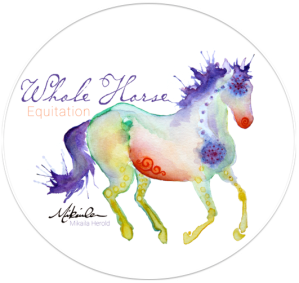
Passionate about horses my whole life, I have always dreamed of a genuine partnership where horse and human choose to work together for a mutually beneficial experience. The horse brings incredible joy, appreciation of natural beauty and a sense of freedom to the people who love him. To the horse, man has the capacity to provide him with the healthy fulfillment of his basic needs, a confident peace of mind and the ability to utilize his forces freely and unhindered.
The horse gives his gifts simply by being present, but the human must pursue many avenues of education in order to be a positive partner for the horse.
My avid pursuit of such an education has led me to study in various countries and within many fields including equine nutrition, farriery, classical equitation, ethology, anatomy, biomechanics and energetic work. My own horse and I even traveled to live and work under various teachers in Europe from 2014-2017. Throughout all of my experiences, I came to see that much of the horse world is stuck in a paradigm of control and domination.
This was not at all what I wanted to reflect in my relationship with horses. Believing that all healthy relationships are about finding an equilibrium which strives to serve and build all involved parties into the best versions of their individual selves (mentally, emotionally, physically and spiritually)… I decided to go my own way.
In 2017 I founded Whole Horse Equitation because I wanted to share this philosophy with others who longed for a better relationship with their horse. It doesn’t matter if you just want to help your pasture pet feel happier and healthier, or if you and your Thoroughbred want to move up the ranks in competitive jumping: Learning to let go of the desire to control and force, while also learning to listen, trust and respect the needs of your equine partner, will help you both create a unique shared language and fulfilling relationship experience.
This approach is extended all the way into how you educate your horse to use his body in a way that makes him stronger, healthier and keeps him working longer as opposed to working him in a way that progressively leads to his physical deterioration. This is obviously the only approach that also lends itself to restorative care in the forms of physical and mental rehabilitation of horses who have suffered ill treatment, trauma and injury. Luckily, all horses have the ability to recognize when a person’s desire is to help and improve upon their well-being and in this case horses “[colts] not only love men– but come to long for them.” (Xenophon)

